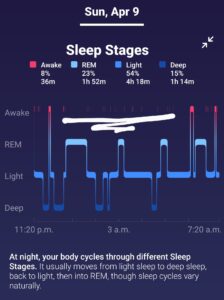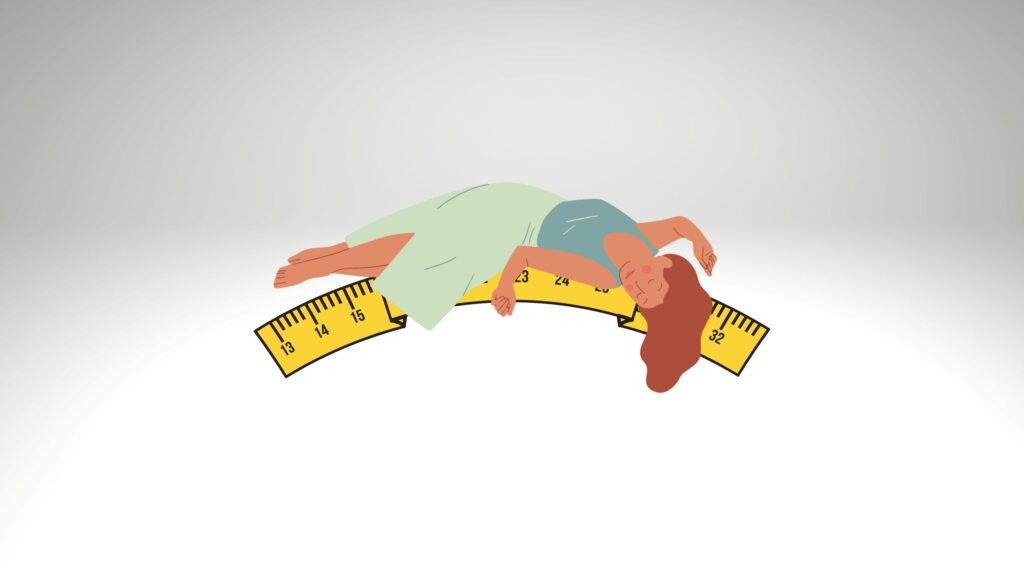It’s funny to be talking about sleep, as I am the poster boy for sleep deprivation. I try to practice what I preach, but sleep deprivation and I go way back.
Fortunately, I have or, better yet, was forced to improve in recent years, as when I hit my 30s, my body finally said eff you and has now mandated I get at least 7 hours of sleep each night. Of course, I still don’t, and in turn, my body ensures I am an inconsolable child the following day.

I am not alone in my struggle, as studies from the National Sleep Foundation in the US of A reported that over 30% of adults achieve less than 7
That is a terrifying number, given the effects a lack of sleep can have on our bodies.In particular, how it can lead to weight gain.
How does sleep deprivation lead to obesity?
When your body is sleep-deprived, it produces more of a hormone called ghrelin and less of a hormone called leptin. Ghrelin is our main hunger hormone, and leptin is our main satiety (fullness) hormone. This flux in hormones leads to your hunger increasing.
Remember a time when you have been more exhausted than usual? And It seemed like you were hungry all day, and wanting nothing but delicious high-sugar and fat foods. This is because your appetite regulation system is out of whack.
So what tends to happen?

We overeat and consume more calories than our body burns. Calories in > calories out = weight gain.
Next, if you are anything like me when you are tired, people may describe you with colourful words that start with a ‘b’ or an ‘a’. This is because a lack of sleep affects our mood and well-being. We are more easily stressed, anxious, and less capable of making mindful choices.
This applies to the way we might treat others and what we snack on throughout the day. Many of us end up engaging in emotional eating to try and make ourselves feel better. And no plate of broccoli comes even close to a plate of fries or some chocolate on the ‘feel better scale.’
Some evidence has even shown that sleep deprivation can slow down your metabolism. So by simply existing, your body will burn fewer calories. If we combine a slower metabolism with an increased drive to overeat, we get weight gain.
Further, none of the above takes into account if you are attempting to lose weight. If you are in a calorie deficit, already fatigued, and unhappy, the effects of sleep deprivation are only going to be magnified.
Sleep Tips & Tricks

Getting one or two bad nights of sleep here and there is normal and likely
won’t affect your weight to any significant degree. The problem occurs when sleep deprivation is a chronic ongoing issue.
The causes of sleep deprivation are vast and outside of the scope of this article, ie. Sleep Apnea.
Nonetheless, until I get around to writing that article, I will provide you with a few tips on how you can improve your sleep.
1. Consistent sleep schedule.
Our body has an internal clock called our circadian rhythm. When we stay up late or sleep in, this throws off our clock and causes ‘social jetlag.’
Playing ‘catch-up’ on the weekends might be making things worse.
2. Stop watching the clock.
Waking up during the night is normal – even every hour on the hour.
Some people develop a habit of becoming more aware of their wake cycle, than looking at the clock. Then they stress about not sleeping, and *boom* sleep deprivation.
Here is the sleep my Fitbit recorded one night. See all the little red lines?! Those are all the times I woke up during the night.

3. Exercise
Hopefully, this one is obvious, but exercise is one of the single best things you can do for your health other than sleep.
4. Limit caffeine and alcohol
If you can cut them out altogether, awesome. However, if you can’t think of a better way to remove what joy is left in your life, then limit consumption to earlier in the day. The earlier, the better.
5. No screens 2 hours before bed
I know it is tempting to scroll through Tiktok and watch some of my amazing videos (shameless plug @theofficialdrdan), but screens, including
TVs, can affect our ability to fall asleep. Sleeping with your phone in another room is even better.
6. Comfortable sleep environment
The optimal temperature for sleep is ~18 degrees Celsius or 60-67 degrees Fahrenheit. Further, invest in a good quality bed. Don’t cheap out. You spend 30% of your day in bed, so make sure it is comfortable!
7. Prioritize sleep
Sounds pretty straightforward, but as I have found along my journey, it is challenging to do. Make it a focus and start with small changes over time.

Some of the above are easy to implement. Others are not, and it will take time before you realize the results. However, keep doing them, and I promise you will see improvements in your sleep.
Contributing to obesity is just one way that sleep deprivation is harmful. There are a plethora of reasons to get a good night’s sleep, and as I have come to find, it can be game-changing for life!
If you have any questions feel free to reach out. If you got some benefit out of this article, feel free to share it with a friend.
—-
References:
Suni, Eric. (2023, April 14) Sleep Statistics. Sleep Foundation. Retrieved from: https://www.sleepfoundation.org/how-sleep-works/sleep-facts-statistics#references-119514
Otherwise, always remember that small tweaks lead to massive peaks!
Until next time.
 Dr. Dan
Dr. Dan
Follow me on social media for regular updates – @TheOfficialDrDan
Subscribe to my newsletter for a heads-up on all new content.
Sharing is caring! Here’s the link for social, email, and even text – https://healthevolved.co/sleep-weight
If you need some coaching support on your weight management journey, you can book a consultation with me to see if you’d be a good fit for our program.
Questions or comments? Please send them my way on our Contact Us page!



 Dr. Dan
Dr. Dan



